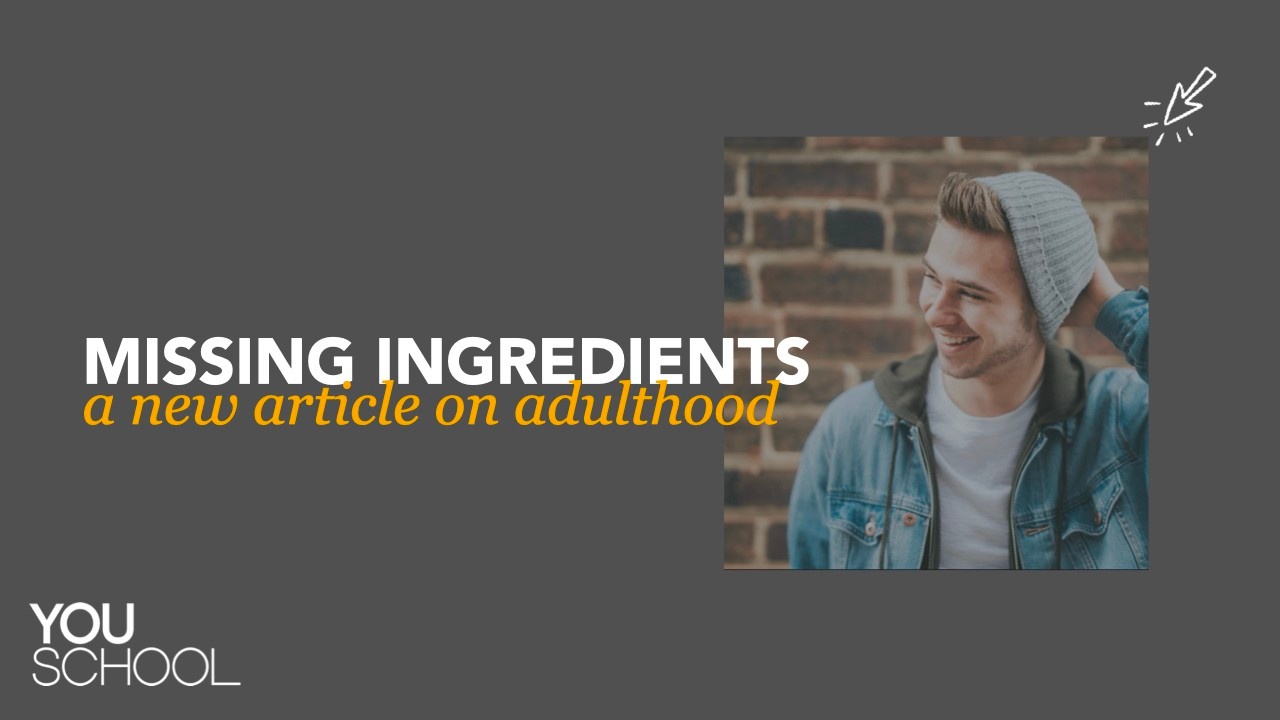The Missing Ingredients of Adulthood

I remember the first time I felt like a real adult— it was when my wife (then girlfriend) and I went to a jewelry store to look into buying an engagement ring. We were only 22 years old, and I was convinced that someone from the back of the store was going to confront us and demand to know why we thought we belonged there.
There were other significant moments, too: the first time I rented a car, the first time I signed home loan documents, and the first time my wife had an ultrasound. Every moment was a weird feeling- I knew I was doing adult-like things, but inside I still felt like I was playing pretend.
So what defines an adult?
Is it someone who is over 18 years old?
Is an adult someone who has graduated college?
Are you an adult when you can pay your own bills?
The judicial system says you’re an adult at 18, the car companies say you’re an adult at 25, and the airlines say you’re an adult at 2 (they make you pay for your own seat, at least).
But just because your age has crossed a threshold, does that mean you’re a true adult?
Once, while coaching a Little League baseball game for my eight-year-old son, an opposing coach (who looked like he was at least fifty) threatened to “meet me in the parking lot” after the game because he thought I unfairly influenced the fourteen-year-old umpire during a close play at the plate.
Another time I got an extremely angry email from a parent who went through a YouSchool group class because I had emailed her a video her daughter made. In all fairness, I had lost her daughter’s email address but had specifically told the students I would send them the videos we made where they shared their ‘life story’ over a three-minute video. The girl was frustrated that I sent it directly to her parents because she wanted to be the one to send it. Her mom’s email had 17 paragraphs (I counted) filled with accusations, unbridled intensity, and threats of my reputation ruined if I ever “lied to another child” again.
You can be an adult according to your age or stage in life, but you can be far from mature. I’m sure you have stories, too.
We’ve been paying a lot of attention over the past few years to learn about the process and developmental thresholds that define adulthood. Whether it’s students in high school making life decisions about what to do after they graduate, or college students taking steps towards a career, or even transitioning military redesigning their lives post-service, the struggles through those transitions are really hard to get a clear glimpse of what life could look like. Ultimately, all those life stages are about growing up, something few people are taught how to do specifically. Most people just go through the motions, do what’s expected of them or of someone at their age, and hope it all works out later on.
You can be an adult according to your age or stage in life, but it doesn’t mean you have it all figured out. In fact, that’s the norm.
Redefining adulthood means we have a different set of parameters to define success. After doing this specific work through the YouSchool for nearly a decade, and a decade before that of leading college students to self-awareness and character-based leadership development, I’m fully convinced that what kids need are guided prompts and an expectation they will respond. It’s not content or answers they need- it’s questions.
Students need to be challenged to answer life’s most important questions. The best environment for them to answer them is simple: first, show them. Have the adults invested in their lives demonstrate what authentic answers sound like. Teachers, parents, principals, and coaches go first. Next, they need some time and quiet space to think for themselves. After that, they need to share with their peers- both in disclosing their own thoughts and hearing from their peers, they will be able to both clarify and navigate to answers that most deeply resonate with themselves.
The process is simple. It’s repeatable. Every parent, every teacher, every coach, and every youth worker can be taught how to lead it. The best way to lead it is to engage in the work yourself.
You can already be an adult according to your age or stage in life, and it’s the perfect time to figure it all out- yourself, the world, and your place in it. It’s never too late. Right now could be your moment to answer life’s most pressing questions, to do the difficult work of self-reflection and discovery to come up with your own answers. I hope you receive these emails as your invitation, and your roadmap, to do just that.
Even more so, I hope that you not only engage in the guided prompts within these articles and do what kids need the most- adults in their lives who are modeling and demonstrating an authentic life and choosing to invest in theirs. But that you choose to move towards kids through personal relationship and ask them these questions. It might be awkward, but it will be worth it.
Do you know what you're going to do when you get older?
Actually, forget what you're going to do. Figure out who you want to be.
Go through our When You Get Older free mini-course.
